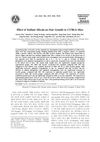137 citations,
January 2006 in “Frontiers in bioscience” CRH in the skin acts like the body's stress response system, affecting cell behavior and immune activity.
 8 citations,
December 2015 in “The Journal of Physiology”
8 citations,
December 2015 in “The Journal of Physiology” The document concludes that stem cell inactivity is actively controlled and important for tissue repair and balance.
 75 citations,
May 2013 in “Journal of the American Academy of Dermatology”
75 citations,
May 2013 in “Journal of the American Academy of Dermatology” Zinc deficiency in children can cause skin issues and can be serious if not diagnosed and treated properly.
August 2024 in “Pharmaceuticals” Oral sturgeon oil promotes hair growth and improves gut health.
 35 citations,
January 2013 in “International Journal of Trichology”
35 citations,
January 2013 in “International Journal of Trichology” Kids with early graying hair often have low levels of calcium, ferritin, and vitamin D3.
 130 citations,
August 2015 in “Experimental Dermatology”
130 citations,
August 2015 in “Experimental Dermatology” Human hair follicle organ culture is a useful model for hair research with potential for studying hair biology and testing treatments.
 January 2022 in “Sustainable development goals series”
January 2022 in “Sustainable development goals series” The document concludes that significant investment in agricultural innovation is necessary to achieve global food security and nutrition.
 48 citations,
October 2011 in “Sports Medicine”
48 citations,
October 2011 in “Sports Medicine” Ice-skating athletes often have skin problems due to cold, infections, and inflammation, needing careful treatment and prevention.
 86 citations,
July 1993 in “Drugs”
86 citations,
July 1993 in “Drugs” Finasteride treats enlarged prostate, shrinks it, improves urination, but may cause sexual dysfunction and isn't for women or children.
 8 citations,
July 2012 in “Cambridge University Press eBooks”
8 citations,
July 2012 in “Cambridge University Press eBooks” Androgens can both increase body hair and cause scalp hair loss.
3 citations,
October 2023 in “Cosmetics” Healthy lifestyle changes can significantly improve skin health as you age.
 13 citations,
April 2023 in “Nature communications”
13 citations,
April 2023 in “Nature communications” Long COVID patients have more health issues than non-infected people.
 February 2023 in “Malaysian Journal of Science. Series B, Physical & Earth Sciences”
February 2023 in “Malaysian Journal of Science. Series B, Physical & Earth Sciences” Analyzing bear poop helps measure their stress without harming them.
 212 citations,
September 2008 in “Journal of The American Academy of Dermatology”
212 citations,
September 2008 in “Journal of The American Academy of Dermatology” Minoxidil and finasteride treat hair loss in men, while minoxidil treats hair loss in women.
 247 citations,
August 2011 in “European Journal of Epidemiology”
247 citations,
August 2011 in “European Journal of Epidemiology” The Rotterdam Study updated its design and objectives in 2012, providing insights into various diseases in the elderly, including skin cancer, bone health, liver disease, neurological and psychiatric conditions, and respiratory issues.
 21 citations,
January 1988 in “Stress Medicine”
21 citations,
January 1988 in “Stress Medicine” Stress affects skin health and emotional well-being should be considered in skin disease treatment.
 11 citations,
January 2001 in “Cambridge University Press eBooks”
11 citations,
January 2001 in “Cambridge University Press eBooks” Androgens can cause hair growth in some areas but hair loss on the scalp.
 15 citations,
January 1971 in “British Journal of Dermatology”
15 citations,
January 1971 in “British Journal of Dermatology” Hair can indicate early signs of metabolic disorders, with issues like protein deficiency stopping hair growth.
24 citations,
May 2015 in “Molecular and clinical oncology” Honey and bee pollen can help reduce menopausal symptoms in breast cancer patients.
 165 citations,
January 2008 in “Journal of biomaterials science. Polymer ed.”
165 citations,
January 2008 in “Journal of biomaterials science. Polymer ed.” The peptide GHK-Cu helps heal and remodel tissue, improves skin and hair health, and has potential for treating age-related inflammatory diseases.
 4 citations,
February 2021 in “Plant journal”
4 citations,
February 2021 in “Plant journal” OsUEV1B protein is essential for controlling phosphate levels in rice.
 4 citations,
January 2010 in “Laboratory Animal Research”
4 citations,
January 2010 in “Laboratory Animal Research” Sodium silicate helped mouse hair grow similarly to a known hair growth treatment.
 January 2024 in “Biological & clinical sciences research journal”
January 2024 in “Biological & clinical sciences research journal” Apigenin, found in plants and vegetables, has many health benefits, including anti-inflammatory, antioxidant, and anticancer effects.
 November 2022 in “CARDIOMETRY”
November 2022 in “CARDIOMETRY” A group has developed therapies that show promise for treating cancer and various other conditions.
 24 citations,
October 2017 in “Biomolecules”
24 citations,
October 2017 in “Biomolecules” Some growth factors, while important for normal body functions, can cause diseases when not regulated properly.
 January 2025 in “Tropical Medicine and Health”
January 2025 in “Tropical Medicine and Health” Most children in orphanages in Fayoum and Giza have skin disorders, mainly noninfectious, and need better hygiene and emotional care.
 7 citations,
November 2019 in “Animal”
7 citations,
November 2019 in “Animal” Melatonin increases cashmere quality in goats but reduces their milk production and doesn't affect their offspring's hair growth.
 1 citations,
March 2024 in “Signal transduction and targeted therapy”
1 citations,
March 2024 in “Signal transduction and targeted therapy” NF-κB signaling is crucial in many diseases and can be targeted for new treatments.
 2 citations,
July 2014 in “Irish Journal of Medical Science”
2 citations,
July 2014 in “Irish Journal of Medical Science” The meeting discussed medical findings, including benefits of certain treatments for cancer and heart conditions, and highlighted issues like poor adherence to preventive measures and skill gaps among interns.
 40 citations,
July 2015 in “Journal of Cellular Biochemistry”
40 citations,
July 2015 in “Journal of Cellular Biochemistry” Cysteine helps maintain keratin production in skin cells even when iron is low.

























